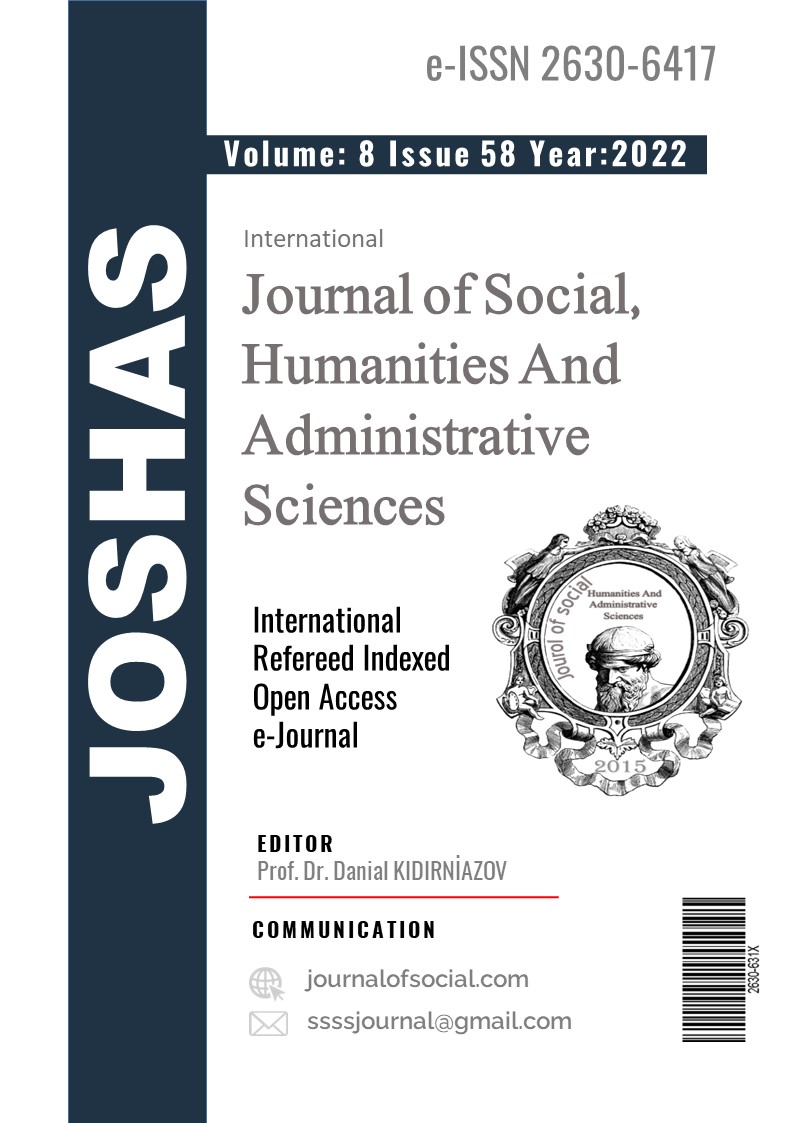Author :
Abstract
Bu araştırmanın Covid-19 salgını süresince öğretmenlerin eğitim-öğretim görevlerini uzaktan eğitim yoluyla sürdürürken nasıl etkilendikleri, karşılaştıkları güçlükler, bu güçlüklerle başa çıkma stratejileri, kullandıkları öğretim yöntem ve teknikleri ve öğretmenlerin öngörülerini incelemektir. Uzaktan eğitime ilişkin yaşanan sorunları belirleyip çözüm önerileri sunmaktır. Araştırmanın çalışma grubu Diyarbakır Çınar ilçesindeki ilkokul ve ortaokul grubudur. Çalışma grubu belirlenirken maksimum çeşitlilik örneklem tekniği dikkate alınmıştır. Veri toplamada görüşme ve literatür kaynak taraması yapılmıştır. Veri toplamak için veri derinlemesine görüşme yöntemi kullanılmış ve bu bağlamda 53 öğretmene 6 soruluk görüşme formu uygulanmıştır.26 erkek 27 kadın öğretmenin görüşleri alınmıştır. Toplanan veriler araştırmanın amacı doğrultusunda çalışma grubunun cinsiyet ve unvan gibi özellikleri baz alınarak analiz edilmiştir. Araştırmanın sonucunda “öğretmenlerin internet alt yapısı ve teknolojik araç yetersizliği, müfredat, ders saati, ders programı, öğrenci velilerinden kaynaklı zorluklar yaşadığı, bu zorluklarla; öğrencilere okulun tatil olmadığını okulun devam ettiğinin hissettirerek, destekleyici etkinlikler, veli ve öğrencilerle iletişimi artırarak başa çıktıkları ayrıca öğretmenlerin uzaktan eğitimde daha çok düz anlatım ve soru cevap tekniğini kullandığı, öğrenci katılımının düşük olduğu gibi bulgulara ulaşılmıştır. Öğretmenlere göre bu salgın devam etmesi durumunda öğrencilerin internet, bilgisayar ve tablet gibi teknolojik ihtiyaçlarının acilen giderilmesini, müfredat konularının ve ders saatlerinin azaltılması, Yüz yüze eğitimle birlikte devam etmesi gibi önerilere de ulaşılmıştır.
Keywords
Abstract
The purpose of this research is to examine how teachers were affected while continuing their education and training duties through distance education during the Covid-19 epidemic, the difficulties they encountered, the strategies to cope with these difficulties, the teaching methods and techniques they used and the predictions of the teachers. It is aimed to identify the problems related to distance education and to offer solutions. The study group of the research is the primary school group in Diyarbakır Çınar district. Maximum diversity was taken into account when selecting the study group. In data collection, interviews and literature review were carried out. The data in-depth interview method was used to collect the data and in this context, an interview form with 6 questions was applied to 53 teachers. Opinions of 26 male and 27 female teachers were taken. The collected data were analyzed based on the characteristics of the study group such as gender and title in line with the purpose of the research. As a result of the research, it was stated that “teachers have difficulties due to the inadequacy of internet infrastructure and technological tools, curriculum, course hours, syllabus, parents of students; It was found that teachers coped with the difficulties by making students feel that the school was not in a holiday period, but that the school was still going on, by supportive activities and by increasing the communication with parents and students, in addition, it was found that teachers mostly use direct instruction and question-answer techniques in distance education, and that student participation is low. According to the teachers, suggestions have been also reached such as meeting the technological needs of the students such as internet, computers and tablets urgently, reducing the curriculum subjects and course hours, and continuing with face-to-face education in case this pandemic continues.
Keywords
- 1. Akdemir, O. (2011). Yükseköğretimimizde uzaktan eğitim. Yükseköğretim ve Bilim Dergisi,1(2), 69-71.
- 3. Avcı, F. ve Akdeniz, E.C.(2021). Koronaviüs (Covid-19) Salgını ve uzaktan eğitim sürecinde karşılaşılan sorunlar karşısında öğretmenlerin değerlendirmeleri. Uluslararası sosyal bilimler ve eğitim dergisi, 3(4), 117-154
- 4. Bakioğlu, B., Çevik, M.(2020) Covid-19 Pandemi sürecinde Fen bilimi öğretmenlerinin uzaktan eğitime ilişkin görüşleri 109-129
- 5. Başaran, M., Doğan, E., Karaoğlu, E. ve Şahin E. (2020). Ajer- Academia Eğitim Araştırmaları Dergisi 2020,5(2), 368-39 https://dergipark.org.tr/pub/egitime-ISSN 2619-9351
- 6. Canpolat, U ve Yıldırım, Y. (2020). Ortaokul öğretmenlerinin Covid-19 salgını sürecinde uzaktan eğitim deneyimlerinin incelenmesi. Açık öğretim uygulamaları ve araştırma dergisi (AUAd), 7(1), 74-109
- 7. Creswell, J. W., & Poth, C. N. (2016). Qualitative inquiry and research design: Choosing among five approaches. Sage publications.
- 8. Çakın, M., külekçi Akyavuz, E.(2020). The Covid-19 süreci ve eğitime yansıması: öğretmen görüşlerinin incelenmesi İnternational Journal of Social Sciences and Education Research, 6(2), 165-186
- 9. Çiçek, İlhan, Tanhan, Ahmet, Arslan, Gökmen ve Buluş, Metin(2020). (inceleme altında/manuscripts under review). ‘’Psychological Inflexibility Predictis Depression and Anxiety during COVID-19: Acceptance and Commitment Therapy Perspective”. doi: 10.13140/ RG.2.2.32134.19526.
- 10. Erol Şahin, A. N. (2019). Atatürk İlkeleri ve İnkılap Tarihi Dersinin Uzaktan Eğitim Yoluyla Öğretilmesi Hakkında Öğretim Elemanlarının Görüşleri. Gazi Üniversitesi Gazi Eğitim Fakültesi Dergisi, 39(1),
- 11. İşman, A. (2011). Uzaktan Eğitim. Pegem A Yayınları. 5.Baskı
- 12. Kavuk, E. ve Demirtaş, H. (2021). Covid-19 pandemi sürecinde öğretmenlerin uzaktan eğitimde yaşadığı zorluklar. Uluslararası pedandragoji dergisi (E-UPAD), 1(1), 55-73
- 13. Lau, J., Yang, B. ve Dasgupta, R. (2020). Will the coronavirüs make online education go viral? timeshighereducation.com/features/will-coronavirüs-make-online-education-go-viral(Erişim tarihi:15 haziran
- 14. Odabaş, H.(2003). İnternet tabanlı uzaktan eğitim ve bilgi ve belge yönetimi bölümleri, Türk Kütüphaneciliği 17(1), 22-36.
- 15. Özyürek, A., Begde, Z., Yavuz, N. ve Özkan, İ.(2016). Uzaktan eğitim uygulamasının öğrenci bakış açısına göre değerlendirilmesi. Karabük Üniversitesi Sosyal Bilimler Enstitüsü Dergisi, 6(2), 595-605. https://dergipark.org.tr/tr/pub/joiss/issue/30780/323661
- 16. Sağlık Bakanlığı.(2020). https://covid19.saglik.gov.tr/TR-66935/genel-koronvirüs-tablosu.htmladresinden 30 kasım 2020 tarihinde erişilmiştir.
- 17. Torkut, O,. Karacadağ, M. C.(2002, Mayıs). Sakarya Üniversitesi uzaktan öğretim önlisans projesi ve SAÜİDÖ. Bilgi Teknolojileri Kongresi’ nde sunulan bildiri, Denizli.
- 18. UNESCO. 2020 COVİD-19 educational disruption and response. https://en.unesco.org/covid19/educationresponse adresinden 06.05.2020 tarihinde erişilmiştir.
- 19. Uyar, E. (2020) Covid-19 Pandemi sürecinde sosyal bilgiler öğretmenlerinin uzaktan eğitime yönelik görüşleri. Kapadokya Eğitim Dergisi, 1(2), 15-32
- 20. WHO. (2020). WHO Director-General’s opening remarks at the media briefing on COVİD-19 -11 March 2020, https://www.who.int/dg/speeches/detail/who-director-general-s-opening-remarks-at-the-media-briefing-oncovid-19---11-march-2020, web adresinden 1 aralık 2020 tarihinde erişlmiştir
- 21. Yıldırım, A. ve Şimşek, H. (2016). Sosyal bilimlerde nitel araştırma yöntemleri (Genişletilmiş 10 baskı). Ankara: Seçkin.
- 22. Yıldız, E. ve Seferoğlu, S. (2020). Uzaktan eğitim öğrencilerinin çevirim içi teknolojilere yönelik öz-yeterlilik algılarının incelenmesi Celal Bayar Üniversitesi Sosyal Bilimler dergisi, 18(1), 33-46





